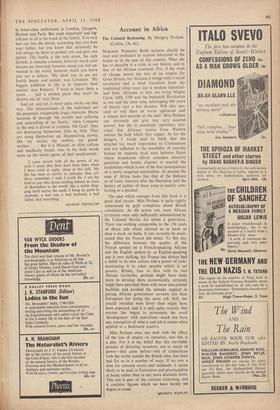Account in Africa
The Colonial Reckoning. By Margery Perham. (Collins, 13s. 6d.) MARGERY PERHAM'S Keith lectures should be read and meditated by anyone interested in the future or in the past of this country. What she has to describe is a. crisis in our history and in that of the African continent. For, if the wind of change means the loss of an empire for Great Britain, for Africans it brings with it social revolution and a brief transition from the traditional tribal ways into a modern industrial- ised State. Africans, in fact, are living Magna Carta, 1688, 1789 and the Industrial Revolution at one and the same time, telescoping 600 years of history into a few decades. Will they suc- ceed or will there be worse upheavals and a relapse into anarchy at the end? Miss Perham can obviously not give any very assured answer, but she is cautiously optimistic, pro- vided that Africans receive from Western nations the help which they expect. As for the dangers, I would tend to think that she attaches too much importance to Communism and not sufficient to the possibility of anarchy broken by endemic local wars between States whose boundaries afford countless minority questions and border disputes to nourish the irredentism which is one of the first consequences of a newly acquired nationalism. At present the map of Africa looks like that of the Balkans or of Latin America after the liberation, and the history of neither of those areas is exactly com- forting as a parallel.
The past which emerges from this book is a good deal clearer. Miss Perham is quite rightly unharassed by guilt complexes about British colonialism. As she points out, most African territories were only sufficiently administered by the Colonial Service for about a generation. There was nothing comparable to the 150 years of direct rule which allowed us to leave so deep a mark on India. It can certainly be main- tained that the French did better. To this day the difference between the quality of the French spoken by a French-speaking African and the English spoken by an English-speaking one is very striking, but France has always had a belief in its own culture and a power of com- municating it to other peoples which is sui genoris. Britain, face to face with its vast African territories, perhaps might have done more to develop them economically, certainly might have provided them with more educational facilities and avoided the mistake implicit in paying African government servants less than Europeans for doing the same job. Still, the crucial mistakes were fewer than might have been expected, and it is only quite recently that anyone has begun to pronounce the word 'development' with conviction—much less have any conception of what a vast job it means when applied to a backward country.
Miss Perham does not deal with the effect of the loss of empire on ourselves, and this is a pity. For it is my belief that this inevitable process of divesting ourselves, not so much of power—that came before—but of connections with the world outside the British Isles, has been bad for us in a number of ways. If we owe a debt for colonial errors and misdeeds, it seems likely to be paid in frustration and provincialism at home rather than in any more dramatic form. This too is part of the colonial reckoning, and it contains figures which we have hardly yet begun to count.
ANTHONY HARTLEY


































 Previous page
Previous page